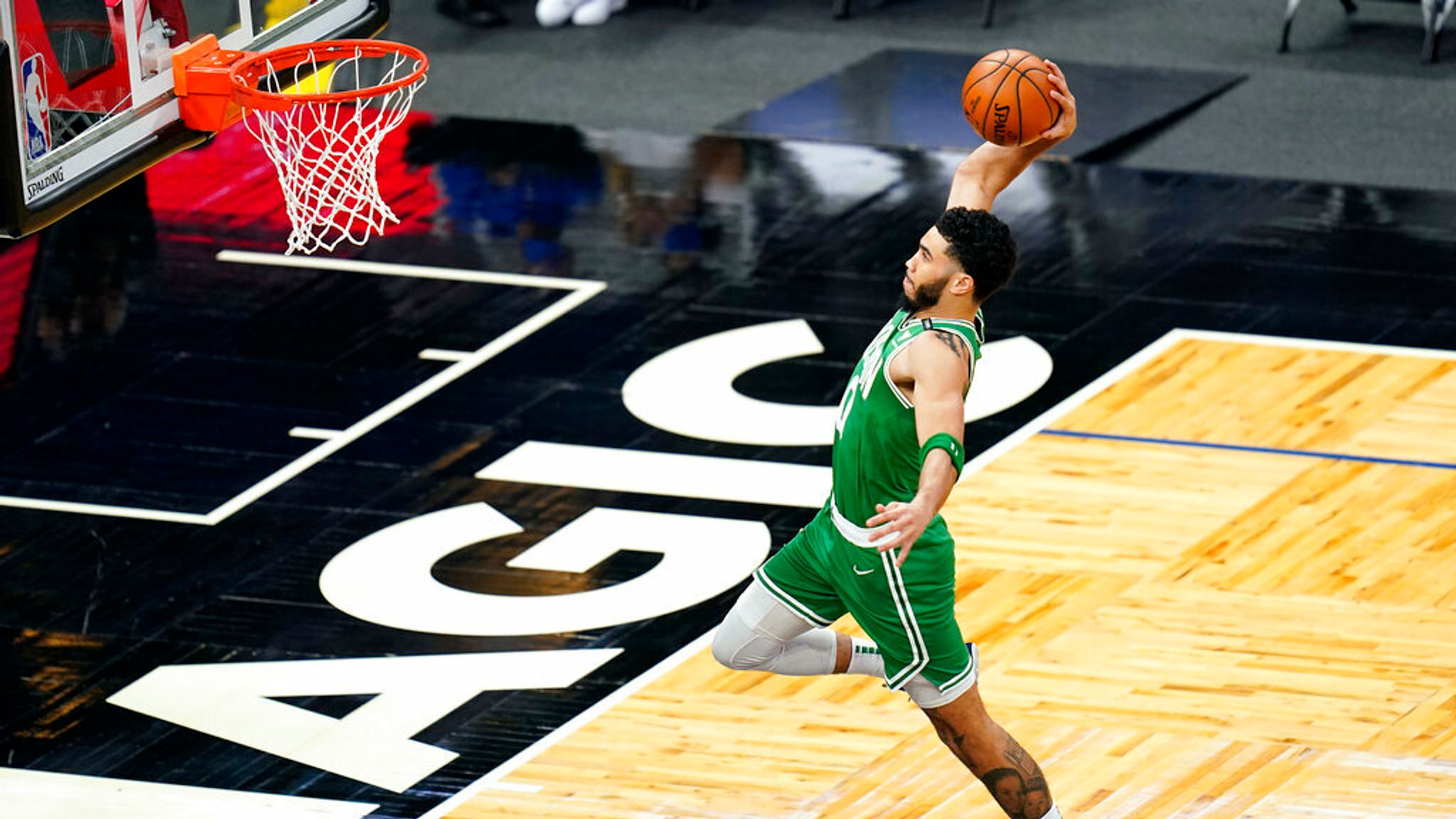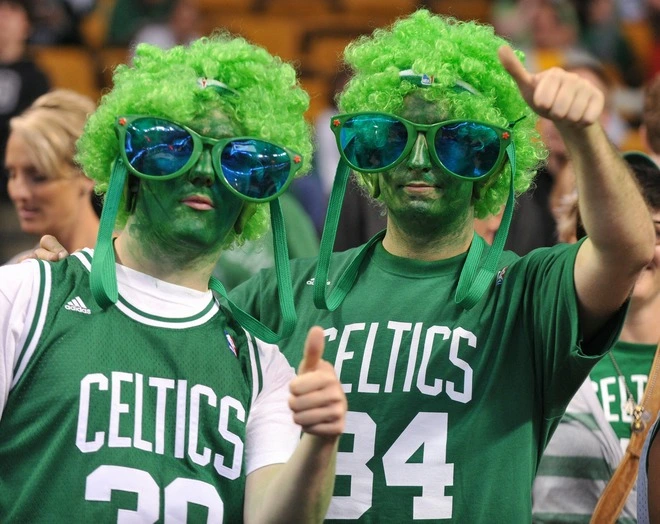Turning something into something: three skills three Celtics can get even better at
A lot of time and effort is dedicated to improving on weaknesses, but Derrick White, Jayson Tatum, and Robert Williams are primed to improve on things they’re already quite good at.

Much is made of players adding new skills and turning strengths into weaknesses in the offseason. For good reason, new skills are the lifeblood of player development. They turn G-Leaguers into role players, role players into starters, and starters into stars. But sometimes it’s just as important to hone what you’re already good at, to ignore all traditional convention and turn good into gooder.
Every player on the roster can get better at something, but I’m going to focus on three very important Celtics: Derrick White, Jayson Tatum, and Robert Williams.
Derrick White’s head, shoulders, knees and toes, knees and toes
Derrick White shot 31.2% from three in the 21-22 season. That feels almost impossibly low given what he did last year. White rose from the ashes like a piece of ash blown by the wind (nothing else ever actually rises from ashes) and shot a solidly above average 38% on about 5 threes per game in 22-23.
That is career trajectory changing improvement. It removes the hard ceiling that a lack of shooting puts on any NBA point guard. It’s also a bit misleading because in the year prior he shot 34.6%. Still a far cry from 38%, but much more respectable than 21-22. One could chalk it up to sample sizes or getting more open shots, but as it often is with White, it’s more than that. Derrick White put in the work. To put it terms that my favorite gravel-munching, exhaust pipe-smoking, worm-enjoying English manager would understand, Derrick White “ran the hard yards.”
I use a running metaphor for a very specific reason: Derrick White fixed his legs. White’s problem wasn’t his top half, although he shot the ball a little low and has corrected that as well (I think, it’s kind of hard to tell). It was the inconsistency in his takeoff on every jump shot really holding him back.
Now, he’s square, he’s balanced, and he has a nice repeatable little bunny hop every time he shoots it. To put it in terms my 2-year-old could recite but not understand, White’s got his head, shoulders, knees, and toes lined up appropriately on every shot no matter the spot.
The exciting part is that this was Year One of Derrick White’s new jump shot. It’s very likely that as he gets more familiar with the form, his accuracy will only improve. As his trust in the shot grows, so will his confidence, which only feeds into greater improvement, a symbiotic relationship like pistol shrimps and gobies or human and couch. I don’t know where Derrick White’s shooting is headed, but I can tell you one thing: he might never miss again (or he’ll at least shoot 40%).
When I think of the best rim finishers in the NBA, my mind almost never heads towards Jayson Tatum. This shouldn’t be that surprising because I’m dull of wit, but it is also partially due to Tatum’s steady progress as a finisher, as opposed to some one-year jump that smacks you in the face. Year over year, he’s gotten to the rim more often and finished at a better rate, with 22-23 being both his most accurate season since he became the number 1 option with the highest volume.
Only thirteen players attempted seven or more field goals per game from four feet or less. Tatum can count himself as one (and Jaylen Brown, too). While his 66.0% is 10th on that list in FG%, there is nearly as large of a gap between him and 11th (Anthony Edwards 60.9%) as between him and 1st (Joel Embiid 73.0%).
High volume rim attacking is a valuable skill even if you aren’t particularly good at it. Tatum is approaching the high-volume territory at 7.3 FGAs per game while he is simultaneously approaching high efficiency. His rim attacking repertoire continues to grow. Importantly, his left-handed finishing is miles better than his younger years (even with that medieval gauntlet he calls a wrist brace on).
Even with this improvement, there’s still room for Tatum to grow literally and metaphorically. His frame will fill out and his wrist will heal, but he also will work himself into improving at the rim. His touch will get better with more reps and more practice. He’s still prone to getting knocked off balance by bigger defenders and missing some unthinkable bunnies, both of which he can mostly solve with age and experience. Tatum will never be Antetokounmpo at the rim, but he can get pretty close.
The tragedy and triumph of the Dimelord
In a season long, long ago (a little over two years to be more precise), there roamed a man that had unlocked his inner potential. He went from confused spasms of speed and power to controlled bursts. He was unshakeable.
During that 20-21 post-ASG stretch, Rob averaged 2.7 assists per game (4.4 per 36 minutes) with a 17.0% assist percentage. It was a magical time for the Dimelord believers. And then, as is the case often with Rob, he got hurt. He had to rehab in the offseason, unable to hone his skillset, and we’ve yet to see that version of Rob again. He showed flashes under Udoka, averaging a very respectable 2.0 assists per game (2.4 per 36) with a 9.5% assist percentage.
Flashes probably isn’t dramatic enough for what Rob’s passing is capable of, they are more like solar flares. It’s sudden, extremely bright, and possesses a surreal quality that makes you a bit unsure what you just witnessed.
What even is that last pass against the Suns? He’s a center! The problem is since that fateful post All-Star break run, Rob’s passing stats have steadily been declining, with last season being the nadir. His assists per 36 minutes fell to his lowest mark since his rookie season along with his assist percentage.
Unlike Tatum and White where you can anticipate them continuing to hone skills that are on the upswing, Rob’s passing is on the opposite trajectory. But it’s not like he is suddenly unable to read the floor or pick out a pass, Rob’s issues are beyond his skills. They are about his role in the offense.
Just to be clear, I do not blame Joe Mazzulla for not taking advantage of Rob’s passing last season. He was thrust into the head coach’s seat right before the season started and the offense clicked immediately, without Robert Williams. By the time Rob came back, he waffled between fully healthy and banged up, unable to tap into the full-blown Timelord experience on either end. Mazzulla didn’t use Rob any differently than Udoka, he just got a more injured version, hence the slight dip in numbers.
Rob certainly isn’t ever going to be Nikola Jokic, but his passing can be leveraged to make him a more dangerous offensive weapon. It just needs to be done intentionally, and he’s good enough at it that it can add another dimension to the Celtics’ attack. Instead of having Rob chilling in the dunker spot or rolling all the way to the rim, hit him on the short roll where he can pick out guys in various spots.
Just to be clear, I do not blame Joe Mazzulla for not taking advantage of Rob’s passing last season. He was thrust into the head coach’s seat right before the season started and the offense clicked immediately, without Robert Williams. By the time Rob came back, he waffled between fully healthy and banged up, unable to tap into the full-blown Timelord experience on either end. Mazzulla didn’t use Rob any differently than Udoka, he just got a more injured version, hence the slight dip in numbers.
Rob certainly isn’t ever going to be Nikola Jokic, but his passing can be leveraged to make him a more dangerous offensive weapon. It just needs to be done intentionally, and he’s good enough at it that it can add another dimension to the Celtics’ attack. Instead of having Rob chilling in the dunker spot or rolling all the way to the rim, hit him on the short roll where he can pick out guys in various spots.
Just to be clear, I do not blame Joe Mazzulla for not taking advantage of Rob’s passing last season. He was thrust into the head coach’s seat right before the season started and the offense clicked immediately, without Robert Williams. By the time Rob came back, he waffled between fully healthy and banged up, unable to tap into the full-blown Timelord experience on either end. Mazzulla didn’t use Rob any differently than Udoka, he just got a more injured version, hence the slight dip in numbers.
Rob certainly isn’t ever going to be Nikola Jokic, but his passing can be leveraged to make him a more dangerous offensive weapon. It just needs to be done intentionally, and he’s good enough at it that it can add another dimension to the Celtics’ attack. Instead of having Rob chilling in the dunker spot or rolling all the way to the rim, hit him on the short roll where he can pick out guys in various spots.


